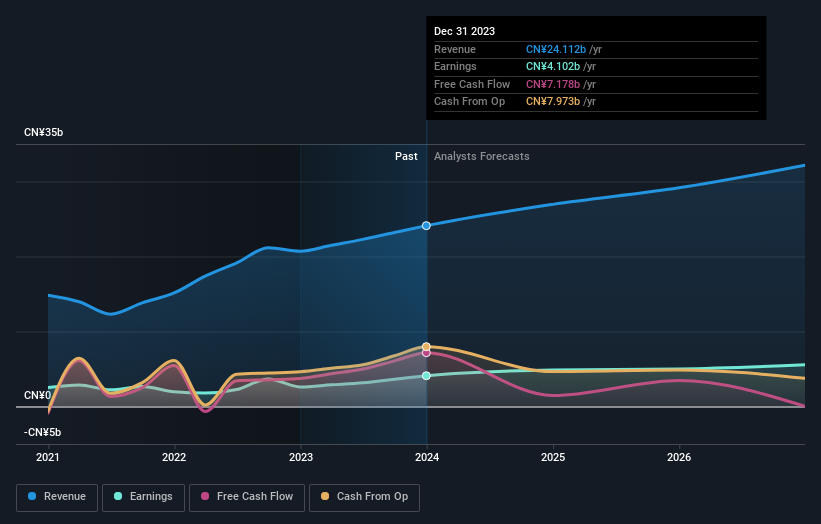Yangzijiang Shipbuilding (Holdings) Ltd.'s (SGX:BS6) top owners are retail investors with 44% stake, while 32% is held by private companies
Key Insights
Significant control over Yangzijiang Shipbuilding (Holdings) by retail investors implies that the general public has more power to influence management and governance-related decisions
The top 14 shareholders own 50% of the company
20% of Yangzijiang Shipbuilding (Holdings) is held by Institutions
If you want to know who really controls Yangzijiang Shipbuilding (Holdings) Ltd. (SGX:BS6), then you'll have to look at the makeup of its share registry. With 44% stake, retail investors possess the maximum shares in the company. In other words, the group stands to gain the most (or lose the most) from their investment into the company.
Private companies, on the other hand, account for 32% of the company's stockholders.
In the chart below, we zoom in on the different ownership groups of Yangzijiang Shipbuilding (Holdings).
Check out our latest analysis for Yangzijiang Shipbuilding (Holdings)
What Does The Institutional Ownership Tell Us About Yangzijiang Shipbuilding (Holdings)?
Many institutions measure their performance against an index that approximates the local market. So they usually pay more attention to companies that are included in major indices.
As you can see, institutional investors have a fair amount of stake in Yangzijiang Shipbuilding (Holdings). This implies the analysts working for those institutions have looked at the stock and they like it. But just like anyone else, they could be wrong. When multiple institutions own a stock, there's always a risk that they are in a 'crowded trade'. When such a trade goes wrong, multiple parties may compete to sell stock fast. This risk is higher in a company without a history of growth. You can see Yangzijiang Shipbuilding (Holdings)'s historic earnings and revenue below, but keep in mind there's always more to the story.
Yangzijiang Shipbuilding (Holdings) is not owned by hedge funds. Looking at our data, we can see that the largest shareholder is YZJ Settlement Julius Baer Trust Company with 22% of shares outstanding. In comparison, the second and third largest shareholders hold about 10.0% and 6.0% of the stock.
Looking at the shareholder registry, we can see that 50% of the ownership is controlled by the top 14 shareholders, meaning that no single shareholder has a majority interest in the ownership.
While it makes sense to study institutional ownership data for a company, it also makes sense to study analyst sentiments to know which way the wind is blowing. There are plenty of analysts covering the stock, so it might be worth seeing what they are forecasting, too.
Insider Ownership Of Yangzijiang Shipbuilding (Holdings)
While the precise definition of an insider can be subjective, almost everyone considers board members to be insiders. Management ultimately answers to the board. However, it is not uncommon for managers to be executive board members, especially if they are a founder or the CEO.
Insider ownership is positive when it signals leadership are thinking like the true owners of the company. However, high insider ownership can also give immense power to a small group within the company. This can be negative in some circumstances.
We can see that insiders own shares in Yangzijiang Shipbuilding (Holdings) Ltd.. This is a big company, so it is good to see this level of alignment. Insiders own S$338m worth of shares (at current prices). If you would like to explore the question of insider alignment, you can click here to see if insiders have been buying or selling.
General Public Ownership
With a 44% ownership, the general public, mostly comprising of individual investors, have some degree of sway over Yangzijiang Shipbuilding (Holdings). This size of ownership, while considerable, may not be enough to change company policy if the decision is not in sync with other large shareholders.
Private Company Ownership
We can see that Private Companies own 32%, of the shares on issue. It might be worth looking deeper into this. If related parties, such as insiders, have an interest in one of these private companies, that should be disclosed in the annual report. Private companies may also have a strategic interest in the company.
Next Steps:
I find it very interesting to look at who exactly owns a company. But to truly gain insight, we need to consider other information, too. Consider risks, for instance. Every company has them, and we've spotted 1 warning sign for Yangzijiang Shipbuilding (Holdings) you should know about.
If you would prefer discover what analysts are predicting in terms of future growth, do not miss this free report on analyst forecasts.
NB: Figures in this article are calculated using data from the last twelve months, which refer to the 12-month period ending on the last date of the month the financial statement is dated. This may not be consistent with full year annual report figures.
Have feedback on this article? Concerned about the content? Get in touch with us directly. Alternatively, email editorial-team (at) simplywallst.com.
This article by Simply Wall St is general in nature. We provide commentary based on historical data and analyst forecasts only using an unbiased methodology and our articles are not intended to be financial advice. It does not constitute a recommendation to buy or sell any stock, and does not take account of your objectives, or your financial situation. We aim to bring you long-term focused analysis driven by fundamental data. Note that our analysis may not factor in the latest price-sensitive company announcements or qualitative material. Simply Wall St has no position in any stocks mentioned.

 Yahoo Finance
Yahoo Finance 

